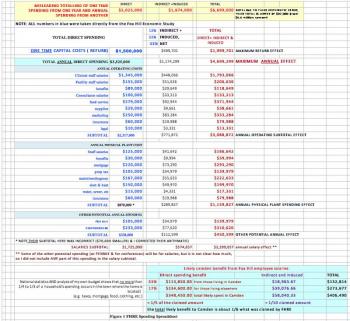Fox Hill Numbers Just Don't Add Up
After listening to Fox Hill Real Estate’s (FHRE) Economic Impact Study presentation at the Oct 17 Camden Planning Board meeting, I have evaluated it in detail.
For over 20 years, as a consultant to major corporations and government agencies, I have provided clients with sophisticated modeling, to help them understand the results they should expect on projects. The projects I supported with this modeling ranged in scale from $100 million to several billion dollars in cost, so what I provided them had to be accurate.
Are the benefits FHRE predicts for Camden really credible? The short answer is NO. It is clear that it was more important to FHRE to be impressive than to be accurate. Any benefit to Camden from the operation will be much less than claimed.
A detailed evaluation of their claimed benefits shows that they were based on both unsupportable assumptions and fraudulent accounting. In their oral presentation on Oct 17, FHRE claimed there would a $6.6 million benefit in Camden, but that number was based on the fraudulent accounting. They added the spending from several different years together to get that number. In fact, the study findings prove that there is NO year in which there could be a $6.6 million benefit, let alone any year not in Camden, or anywhere else. FHRE not only added spending from multiple years put together, it combined one-time renovation spending with annual spending and represented this combination as annual benefit.
At the Nov 20 meeting, the FHRE spokesman acknowledged that the one-time and annual costs must be kept separate, and he acknowledged that what had previously been called benefits to Camden were really benefits spread over the county and beyond. This point is crucial because what is under consideration is a Camden (not county) ordinance change. Hence, it is the benefits and risks to Camden alone that should dominate the deliberations.
If the FHRE economic benefits to Camden are not to be believed, what should we expect in terms of economic impact?
Payments for purchasing goods and services are simple to evaluate. For money spent in locally owned stores like French & Brawn, respected studies show that about 80% of the indirect and induced benefits from that spending will stay in the town. Spending at chain stores (like EBS, Hannaford, Viking, Walmart, Home Depot, national insurance companies, and even banking chains) only 14% to 17% of the indirect and induced benefit is in the town in which these are located. The rest of those indirect and induced effects are distributed throughout all the places these chains have facilities. A very large percentage of the direct spending for items like marketing will occur in the places from which FHRE hopes to attract clients, not in Camden. Consequently, little of their associated indirect and induced effects will occur in Camden.
Salary-related totals for Camden’s benefit (direct plus indirect and induced) would not be the $2,300,000 figure they used, but only $460,000, or less, about one-fifth of their claim.
The property tax reality is no matter who owns Fox Hill. It will have to be maintained and the property taxes will have to be paid, so FHRE cannot take any credit for this spending as an added economic benefit to Camden. In addition, if a non-profit business purchases the property, it will no longer have to pay any property taxes to Camden.
In conclusion, the final result is a far more realistic assessment of the benefit to Camden than the FHRE presentation claimed. The Camden annual total benefit would be at the most one-sixth of what was asserted at the October 17th meeting and less than 1.5% of the annual retail sales total in Camden—certainly not large enough to justify a decision to allow spot zoning.
Of note, any economic benefit, whatever it actually might turn out to be, would occur if the treatment center were located in one of Camden’s business districts, not just at Fox Hill.
For more a more in-depth look at the analysis, please go to www.responsiblezoning.com
Dennis McGuirk has run a consulting business since 1989 and lives in Camden.



























